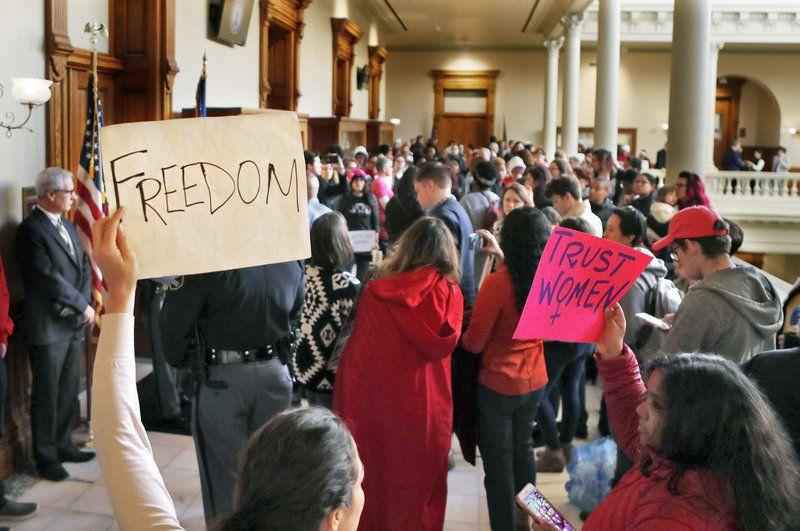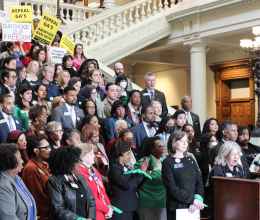
Georgia Anti-Abortion Law Deemed Unconstitutional
Georgia Anti-Abortion Law Deemed Unconstitutional
Other Pages
By Riley Bunch | Daily Citizen-News | July 14, 2020
ATLANTA — A federal judge permanently blocked Georgia’s controversial anti-abortion law Monday calling it “unconstitutional.”
U.S. District Judge Steve Jones of Georgia’s Northern District Court bucked the state and ruled in favor of abortion providers and reproductive rights advocacy groups. Jones had temporarily blocked the law — which never went into effect — last fall.
The Georgia General Assembly narrowly passed House Bill 481 — the controversial heartbeat bill — during the 2019 legislative session. The bill, supported and signed into law by Gov. Brian Kemp, made abortion illegal once a doctor could detect a fetus’ heartbeat.
That point is usually six weeks into pregnancy and often before a woman knows she’s even pregnant, plaintiffs argued.
The American Civil Liberties Union, Planned Parenthood and other reproductive rights groups filed the lawsuit in June of last year on behalf of Georgia’s abortion providers.
Jones wrote in his ruling the law violates a woman’s constitutional right to access an abortion established by the 1973 U.S. Supreme Court decision in Roe v. Wade.
"It is in the public interest, and this court's duty, to ensure constitutional rights are protected,” he wrote in a 67-page opinion.
Monica Simpson, executive director of SisterSong — the lead plaintiff and reproductive rights advocate for women of color, said in a statement the win “makes a very bold statement.”
“No one should live in a world where their bodies and reproductive decision making is controlled by the state,” she said.
In a report released last fall by the Guttmacher Institute — which supports abortion rights — abortion rates in Georgia in 2017 rose as nationally they fell. Still, 95% of Georgia counties had no clinics that provided abortion services although 55% of Georgia women lived in those counties, the report says.
Staci Fox, president and chief executive officer of Planned Parenthood Southeast, said while advocates are celebrating a major victory, the “fight is far from over.”
“While people across this state and around the country are literally dying from COVID-19 and systemic racism, our leaders should be focused on expanding access to health care — not restricting it,” she said. “We will not back down until access to health care — including safe, legal abortion — is recognized as a basic human right."
Sean J. Young , legal director of the ACLU of Georgia, said the judge blocked the post six-week abortion ban because it went against 50 years of Supreme Court precedent.
“This case has always been about one thing: letting her decide,” he said in a statement. “It is now up to the State to decide to appeal this decision and prolong this lawsuit.”
Appealing the decision is exactly what Kemp vowed to do not long after the ruling was made.
“We will appeal the Court’s decision,” he said on social media. “Georgia values life, and we will keep fighting for the rights of the unborn."
Freshman U.S. Sen. Kelly Loeffler — who was appointed by Kemp to fill the spot made vacant by former U.S. Sen. Johnny Isakson's retirement — backed the Republican governor and called for the appointment of judges who aligned with pro-life values.
The decision comes on the cusp of a contentious election year — with Georgia Democrats looking to flip seats in the Statehouse and Congress.
"Republicans have made it clear that they will always put extreme partisan interests over our fundamental freedoms — this fight is not over until we replace them in November," Nikema Williams, chairwoman of the Democratic Party of Georgia, said.
“Yet again we see why it's so important to confirm judges who believe in the U.S. Constitution and the right to life,” she said on social media. “We will keep fighting to protect the most vulnerable among us!"

Protesters opposed to a proposed abortion bill fill the hallway on Monday, March 18, 2019, in Atlanta. A Georgia Senate committee approved a measure that would ban most abortions once a fetal heartbeat can be detected. Republicans in Georgia are joining others in many states moving to enact tough abortion restrictions, even though they're certain to be challenged in court, in hopes that recent appointments to the U.S. Supreme Court will find them constitutional. (Bob Andres/Atlanta Journal-Constitution via AP)
Bob Andres
Related content

SB 283 - Pregnancy Protection Act
February 15, 2024Georgia Supreme Court Allows Six-Week Abortion Ban to Remain in...
October 24, 2023
Press Statement: The ACLU of Georgia responds to Appeals Court...
August 18, 2023
Reflecting on the Impact of Dobbs Ruling a Year Later
June 27, 2023
Andrea Young Honored With Lifetime Achievement Award For...
January 27, 2023
Ga. House And Senate Members Introduce Bills To Repeal The State’s...
January 25, 2023
Get Involved In The 2023 Legislative Session: Lobby Day And Capitol...
January 23, 2023